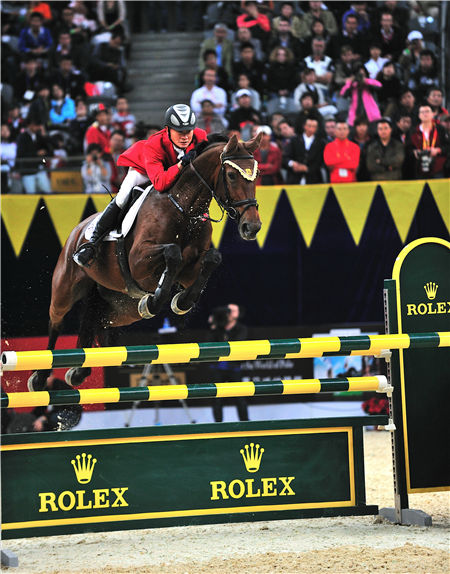Over and through the hoops
 |
|
Photo provided to China Daily |
"I was frustrated because I was falling from horses so often and could not see any improvement in my riding. Apart from that, the horses were not good enough and I was short of money."
Nevertheless, Huang still nursed his desire to compete in the Games in Beijing, and it was that that kept him going.
He spent six to seven hours on horseback at a stretch and practiced squatting whenever he was not training because he needed to increase his lower body strength, he says.
His training abroad greatly increased his competitiveness, and he took part in competitions in Germany, Italy and Croatia.
Huang says he was the first Chinese rider to attend a four-star show jumping competition (at least two vertical obstacles with a height of 1.5 meters and six others at 1.45 meters, among other requirements in things like course length and indoor and outdoor speed) in the World Cup series in Croatia in 2008. He was sixth in an event in Hagen, North Rhine-Westphalia, in May 2008.
When Huang finally qualified for and then competed in the Beijing Olympics-the equestrian events were in fact held in Hong Kong-h(huán)e says, he felt his dream had come true and did his country proud.
There would be no medals, but he was satisfied with the way he rode and feels it did justice to him and the years of training he had put in for it.
In more recent years Huang has devoted himself to popularizing equestrianism, for which he offers training.
In 2009 he opened his own stables, on land that covers 8,000 square meters and with 30 horses. The grounds are used strictly for training, he says.
Most days he spends six hours training 10-15 horses and teaches students show jumping for three hours.
He has also organized equestrian events to promote the sport and was one of the forces behind the annual Equestrian Beijing Masters competition in 2011 and the China equestrian tour in 2013.
Huang says he sees horses as partners rather than as merely tools with which to win events.
"Riders have to know their horses very well, and it takes one year for a rider to get used to his horse."
Even if he were to be blindfolded, he says, he could identify each of his 30 horses by riding them and sensing the way they move.
The health of horses has always been his top priority, he says, and in the quest for good nutrition he has sent people to grasslands across China looking for the best food for his horses.
Huang says he is highly optimistic about the growth of equestrianism in China.
"We've seen great momentum in domestic development."
China introduced an internationally recognized system of rating riders last year, and since then hundreds of riders have registered each month, he says.
"As yet, fewer than 100 teenagers are signed up for competitions, so growth could be explosive."
Talking of the sport's costs, he says equestrianism need not be the preserve of the rich.
"Ordinary people can afford it if they're not doing it for competition."
The upkeep of a horse is between 1,000 yuan ($156) and 2,000 yuan a month, and Huang says that is money well spent for keeping one's health and improving one's character.
Contact the writer at [email protected]
Luan Shu contributed to the story.






















